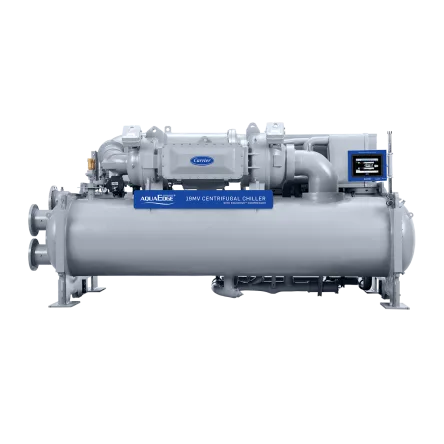
An industrial chiller is a device or system used to cool or lower the temperature of a large-scale industrial process or equipment. It is designed to remove heat from liquids, gases, or solids, thereby maintaining stable temperatures required for various industrial applications. Industrial chillers are commonly used in industries such as manufacturing, food processing, pharmaceuticals, chemical processing, data centers, and more.
Here are some key features and components typically found in an industrial chiller:
- Compressor: The compressor is a vital component that circulates the refrigerant and compresses it to increase its temperature and pressure.
- Condenser: The condenser is responsible for transferring heat from the refrigerant to a cooling medium, such as air or water, causing the refrigerant to condense into a liquid.
- Evaporator: The evaporator absorbs heat from the process or equipment being cooled, causing the liquid refrigerant to evaporate and turn into a gas.
- Expansion Valve: The expansion valve regulates the flow and pressure of the refrigerant as it moves from the high-pressure side to the low-pressure side of the system.
- Refrigerant: Industrial chillers use various refrigerants, such as R-134a or R-410a, depending on the specific application and environmental considerations.
- Cooling Medium: The cooling medium, either air or water, is used to remove heat from the condenser and maintain the desired temperature.
- Pumps and Fans: Industrial chillers may include pumps or fans to circulate the cooling medium, ensuring efficient heat transfer and cooling performance.
- Control System: A control system with sensors, thermostats, and a controller manages and regulates the chiller’s operation, maintaining the desired temperature setpoints.
Industrial chillers can be classified into different types based on their cooling methods:
- Air-cooled chillers: These chillers use air as the cooling medium for condensing the refrigerant. They are often used in areas where water availability is limited or expensive.
- Water-cooled chillers: Water-cooled chillers utilize water as the cooling medium for the condenser. They are more energy-efficient compared to air-cooled chillers but require a reliable water source or cooling tower.
- Absorption chillers: Absorption chillers use heat energy, typically steam or hot water, to drive the refrigeration cycle. They are suitable for applications where waste heat or alternative energy sources are available.
Industrial chillers play a crucial role in maintaining optimal operating conditions for industrial processes, preventing equipment damage due to heat, and ensuring product quality and safety. They are designed to handle high cooling loads and are available in various capacities to suit different industrial requirements.
